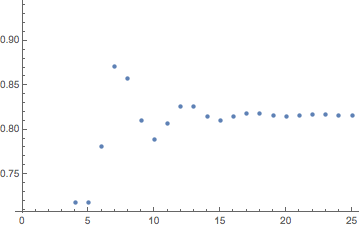This question is related to my question here such that i want to find a closed form of $\int_{-1}^1 x^{2k} (\operatorname{erf}(x))^k \,dx $ , for $k$ is even integer because for odd integer is $0$ as we have integrand of odd function , Really for $k=2$ it gives a nice closed form as shown here in wolfram alpha, Now my question here is :
Question:
Is it possible to get a Closed form of :$\int_{-1}^1 x^{2k} \operatorname{erf}(x)^k \,dx $ for $ k$ is even integer?
Note: The Motivation of this question is to find a Series representation of :$\int _{0}^{t}\exp(-x^2 \operatorname{erf}(x))dx$

